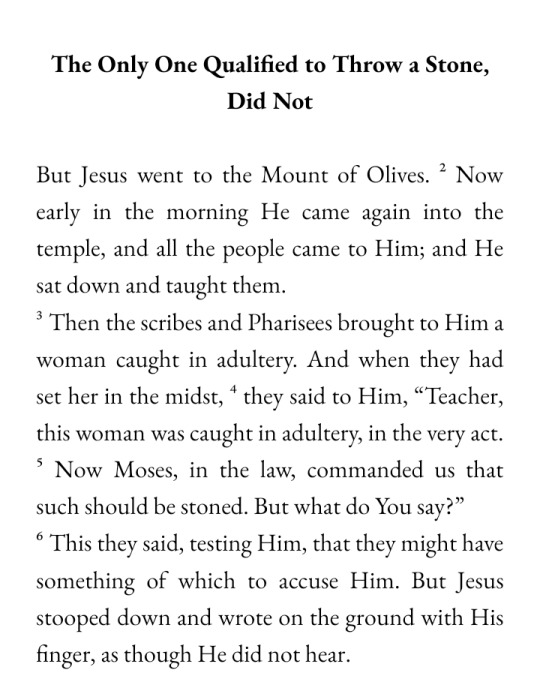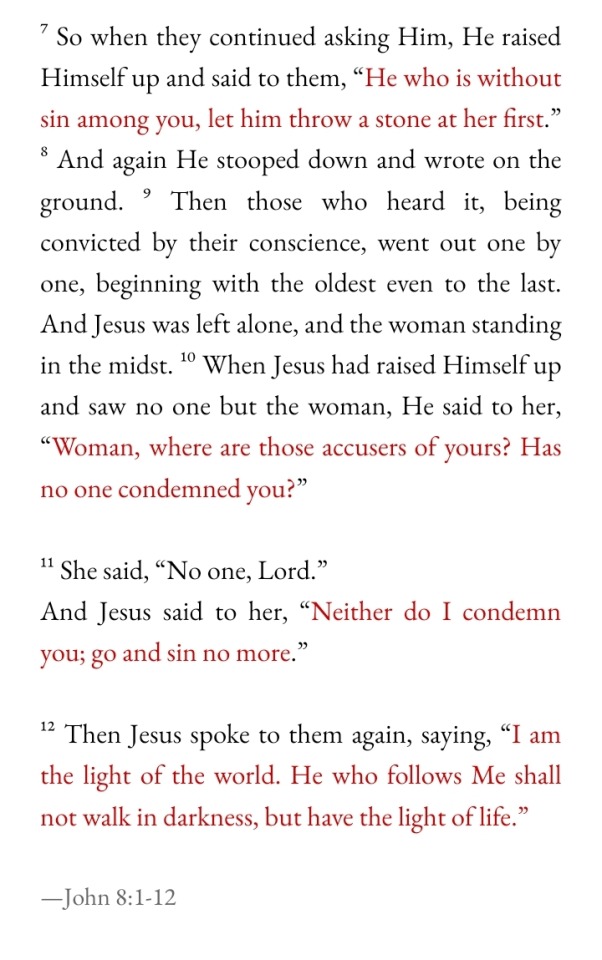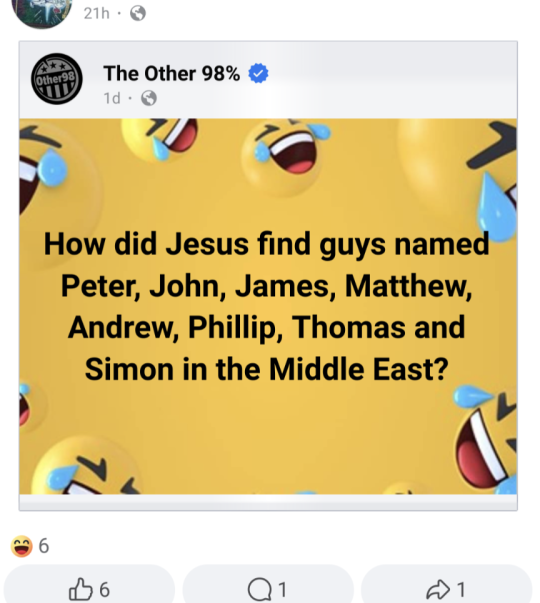#New Testament Bible stories
Explore tagged Tumblr posts
Text










🇵🇷 It was the last day of VBS in Ponce. Interestingly, another youth camp joined our camp and with a larger number of kids attending, we combined into one group. So far, everything has been awesome. 🎨🎁 #vbs #poncepuertorico #youthcamp #kidsartsandcrafts #pizzaparty #kidsbeingkids #youthministry
#vbs#kids arts and crafts#pizza party#youth camp#youth ministry#New Testament Bible stories#New Testament parables#Jesus loves us#Thank you God#kids being kids#Ponce Puerto Rico#mission trip#July 2023#selfiie#VBS selfie
1 note
·
View note
Text


#Jesus Christ#gospel#John#holy bible#new testament#bible study#bible reading#bible verse#bible quotes#bible#scripture#christianity#christian#christians#christian faith#faith#faith in God#faith in Jesus#christian encouragement#christian quotes#Jesus#Christ#christian living#christian blog#biblia#nkjv#bible story#bible quote#bible scripture#God
91 notes
·
View notes
Text

St. Joseph's Dream
Artist: Anton Raphael Mengs (German, 1728–1779)
Date: circa 1773-1774
Medium: Oil on Oak Wood
Collection: Kunsthistorisches Museum, Vienna, Austria
St. Joseph's Dream | Matthew 2:22
In the classic thinker’s pose, his head leaning heavily on his arm, Joseph receives instructions from God whilst asleep: he is to lead into Egypt Mary and the Infant Jesus, to escape Herod’s henchmen. The clear composition, the frontal depiction which emphasises contours, the unemotional representation all show the classicist painter as overcoming the Baroque art of illusion and staging. While Mengs in his drive to innovate starts out from antiquity and Raphael, there is also an echo of Correggio’s sfumato painting in the soft sensualism of his pictures.
#religious#painting#oil on oak wood#anton raphael mengs#german#european#joseph#angel#instructions#bible story#new testament#christianity#flight into egypt#gospel of matthew
25 notes
·
View notes
Text
So there are some rather blatant Jesus imagery and paralells with Pomni in the Amazing Digital Circus so far, so i thought i might as well note them all down, since nobody else has done so yet.


Obviously there is her taking Jesus place in the last supper shot at the end of episode 1, even sharing his color scheme of red and blue.
There is also some very specific imagery here, givem that the last aupper is... Well, Jesus last supper with his Apostles. It's signifigance is that it is the moment that heralds in the end of their journey together, where the inevitable march to the chrucifiction and resurrection truly begins.
Similarily, though none of the character knows it, Pomni's arrival similarily heralds in the end of their own journey.
This series story will end in one season, meaning that wheter they escape or falls to doom, their long tale of perserverance and suffering will be at an end soon.

Then of course there is episode 2, where Pomni travels into a desert, where she ends up separated from her own fellowship, and is tested moraly and spiritually.

Which has paralels with Jesus time alone in the desert, where he faced his temptations, preparing him for what is to come.
Though obviously rather different in nature, this very much is the two's darkest hours, their greatest moments of doubt and pain.
For Jesus it was facing and accepting his mortality as a Human being, and refusing to give in to the temptation of calling upon the divine to lessen his heavy burden, and accepting the cruel fate that was in store for him.

His companion in this moment of darlness was of course the devil, there to tempt him, and challenge him in hope of derailing God's plan.
Instead he rebukes his words, and resolves to keep moving forward towards his destiny, to see his fate through to the end for the good of his fellow man.

Pomni's situation and her companion is a bit different, but the overall point remains the same, that this is her great moment of temptation, and it is in response to her companion that she resolves to keep going.
The main difference of course is that Gummygoo's questioning of Pomni is not directly about her own worth, but instead of his own. The question of wheter he, a being with seemingly no soul, but with the capacity to think, has any value at all compared to her in his eyes, divinely blessed nature.
Pomni here shows the person she truly is deep down, a kind, gentle soul who gives Gummygoo the warmth, support and love he needs to keep going forward, affirming that yes, he does have worth, his existence does mean something.
He is as real as she is... And that means he is a real person, worthy of being loved and cared about. Which in turn means she is. She is not some worthless thing, but a Human being who is still alive despite it all. And she's going to live on.

But of course her journey in this episode doesn't end there, for after finally finding the resolve to keep on living, that newly made resolve is then immediatly tested by Caine(Named after the first murder acording to the Bible) calously and with no hesitation or regret murders Gummygoo.
This part doesn't have a direct parallel in Jesus life, but one could view Caine's actions as being parallel to the Devil's words and temptations, where he puts the question to Jesus of why not take the easy way out as God's divine son, instead of continuing the hard road as a Human being of flesh and blood?
Both test our heroes resolve, but in different ways.

Regardless, the story ultimately ends similarily, as though Pomni has a moment of nearly breaking under her trial, of truly giving up on the idea that her life matters, the message she discussed and preached to Gummygoo, Pomni ultimately manages to overcome her great test of character by embracing her bond with her fellow Human beings.

She overcome her great temptation of giving in to darkness, and is now ready to keep moving forward on her journey.
It is that love for her fellow man, that gives her the resolve to keep moving forward towards her destiny, regardless of what it might hold in store for her.

And regarding Jesus parallels, there is of course this shot from the production team that speaks for itself.
We have no idea of the context, or what episode this is gonna be from, but given the stuff we got from episode 1 and 2, it's not too hard to guess it's probably gonna be one of the more important moments of the story.
#the amazing digital circus#pomni#jesus christ#meta#analysis#story analysis#parallels#the bible#the new testament#gummygoo#caine#the devil
29 notes
·
View notes
Text

#bible#faith#bible scripture#god#jesus#christ#christianity#bible study#scripture#christian#bible verse#biblical scripture#old testament#new testament#faith in jesus#jesus christ#motivation#bible story#bible quote
10 notes
·
View notes
Text

The old testament vs the new
In examining the Torah, we see God depicted as a masterful teacher, with His words as precise and purposeful as arrows shot from a bow, aimed to strike their intended targets. These divine arrows implant spiritual seeds within the hearts of genuine seekers, who then have the choice to nurture and cultivate these seeds. The Bible, or the Word of God, provides guidance and instruction for developing our spiritual lives. The Old Testament establishes the foundation and groundwork for God's creation, while the New Testament dynamically fulfills and expands upon this foundation.
The Old Covenant, or Old Testament, sets the standard for spiritual living, promoting good health and a prosperous life centered on God. As the Israelites learn more about God's sovereignty and holiness, they also become aware of their own shortcomings and are required to offer blood sacrifices at the altar for the atonement of their sins. Nevertheless, God promises to deliver the Israelites from their sins and provide them with a true king and messiah. The Old Covenant's purpose is to reveal how far humanity has strayed from God, with our sinful natures obstructing the lives God intended for us.
Romans 3:20 (NIV) states, "Therefore no one will be declared righteous in God’s sight by the works of the law; rather, through the law, we become conscious of our sin." This verse highlights the main function of the Old Covenant: to make us aware of our sins and establish the foundation for the New Covenant. The Ten Commandments, outlined in Exodus 20, convey God's desire for us to prioritize our spiritual needs and recognize that we are spiritual beings inhabiting physical bodies.
In the 10 commandments, God urges us to turn inward and seek His eternal truths, cautioning us against idolatry and excessive indulgence in material things that could hinder our spiritual growth. By placing our spiritual development first, we open the door to receiving everything we desire in life.
It also emphasizes the importance of respecting and honoring God's name, as well as the power of our speech. We are reminded that our words have immense influence, and we must use them wisely. The commandment to observe the Sabbath highlights the need for balance in our physical and spiritual lives, dedicating time to both work and rest.
The final commandments address honoring one's parents, refraining from murder, adultery, theft, bearing false witness, and coveting. While these commandments may seem straightforward, Jesus explains in Matthew 5:28 (NIV) that even lustful thoughts are equivalent to committing adultery in one's heart. This demonstrates the strict nature of God's laws, which apply not only to our actions but also to our thoughts and intentions.
The Old Covenant serves to show us the extent of our deviation from God's original design, revealing the stark contrast between the physical and spiritual realms. Despite our shortcomings, God's love for humanity is unwavering, and He desires to alleviate suffering and create a world where all our basic needs are met. John 3:16 (NIV) proclaims, "For God so loved the world that he gave his one and only Son, that whoever believes in him shall not perish but have eternal life."
The Old Testament, with its meticulous historical records and fulfilled promises, serves as the foundation for the transformative New Covenant. The ultimate blood sacrifice of Jesus Christ liberates us from the need for animal sacrifices and paves the way for a new world of spiritual growth and divine connection.
Jesus was born in the quaint town of Bethlehem and experienced a childhood not unlike others of that time. Intriguingly, the Bible offers no account of Jesus' life prior to the age of thirty, save for one incident described by his friend Luke. During a visit to Jerusalem with his parents, Jesus went missing, prompting a frantic three-day search. Ultimately, they discovered him at the temple, engaging in animated conversations with religious teachers and posing thought-provoking questions. After a gentle admonishment, Jesus accompanied his parents back to their hometown. It is surmised that, in keeping with tradition, Jesus may have followed in his carpenter father's footsteps before commencing his ministry at the age of thirty—the age at which an Israelite could become a priest.
As Jesus continued to teach and enlighten, he consistently referenced the Torah and the Laws of Moses to validate his lessons. His teachings attracted a substantial following of influential Jews and Romans, but also alarmed Jewish authorities who felt their positions jeopardized by rumors of Jesus becoming the King of the Jews. Desperate to convict him, they attempted to catch him in either legal transgressions or contradictions with their laws, only to be consistently thwarted by Jesus' authoritative and unassailable explanations. In many instances, Jesus corrected these men's flawed understanding of the law, speaking boldly and fearlessly to high-ranking officials in a manner that would have had ordinary men executed.
By challenging Israel's religious leaders and rebuking influential figures, Jesus sparked a revolutionary movement. Defying cultural norms, he offered compassion and healing to gentiles and unbelievers, providing hope and becoming a cornerstone for the oppressed. Undeterred by the turmoil he incited among authorities, Jesus continued to heal the brokenhearted and proclaim God's Word. He identified Old Testament prophecies and scriptures referencing his arrival, yet Jewish leaders' animosity and envy only grew, fueling their schemes against this widely revered teacher.
Through his tender yet commanding demeanor, Jesus laid the foundation for a new covenant, making disciples to disseminate the good news of forgiveness and the truths of both the old and forthcoming covenants. Though he performed numerous awe-inspiring miracles, his most significant achievement was the fulfillment of the old covenant, which he elucidated to the Jews.
Matthew 5:17 New Living Translation
“Don’t misunderstand why I have come. I did not come to abolish the law of Moses or the writings of the prophets. No, I came to accomplish their purpose.
It is challenging to grasp that Jesus' ultimate purpose was to sacrifice himself for the sins of the world, and even more unfathomable that such a dramatic event was required to fulfill the law. However, upon reflection, this pivotal moment in history reveals an undeniable divine design. Every aspect was meticulously orchestrated to etch this event into history and the collective consciousness of humanity.
The Passover, initially an agricultural spring festival, prompted the entire population of the kingdom of Judah to journey to Jerusalem. During this public holiday, the city teemed with jubilant celebrants commemorating their escape from Egypt. Much like a carnival or music festival, the city was alive with excitement and anticipation, especially as rumors circulated that the new king of Israel would appear. In this particular year, the bustling atmosphere was comparable to a popular holiday destination in December.
Indeed, the king of Israel arrived, welcomed by throngs of people who lined his path with palm branches and their own garments. It was a triumphant entrance reminiscent of a championship football team's homecoming. Jesus' miraculous deeds and teachings had spread far and wide, and he had become a beacon of hope for countless downtrodden and oppressed individuals. They chanted praises, celebrating his arrival (Matthew 21:9 NLT).
However, the festivities took a dark turn as the time for prophecy fulfillment arrived. The plot to kill Jesus came to fruition as he was captured, tried, and ultimately crucified, despite being found innocent by the Roman governor who presided over his trial. The tumultuous crucifixion was an essential component of God's plan, witnessed by the entire Jewish nation. Jesus' final words on the cross signified the accomplishment and fulfillment of the ancient prophecy and covenant.
John 19:28-30 (NLTSE) Jesus knew that his mission was now finished, and to fulfill Scripture he said, "I am thirsty." A jar of sour wine was sitting there, so they soaked a sponge in it, put it on a hyssop branch, and held it up to his lips. When Jesus had tasted it, he said, "It is finished!" Then he bowed his head and released his spirit.
At that instant, a massive earthquake shook Jerusalem, and the temple's central curtain, which separated the Holy of Holies, was miraculously torn asunder. This marked the beginning of the new covenant established by God himself for all eternity. The tearing of the veil symbolized that all humanity now had access to God (Hebrews 10:19-25 NLT).y
The extraordinary events in Jerusalem had only just begun, as the people of Israel were about to witness a revelation far greater than they could have imagined. After Jesus' death, Pontius Pilate, the Roman governor of Judaea, ordered Jesus' body to be placed in a tomb and guarded indefinitely. Both Roman and Jewish authorities were aware of Jesus' claim that he would be resurrected after three days, so Roman soldiers were stationed to secure the tomb. It is likely that Jewish authorities also sent their own guards to keep watch.
Despite various theories attempting to explain the mysterious disappearance of Jesus' body, he reappeared three days later, alive and well. Numerous accounts in the Bible document Jesus' post-resurrection appearances. On one occasion, he revealed himself to a crowd of over 500 people, allowing them to touch him to dispel their disbelief. A few decades later, the Apostle Paul wrote to the Corinthians, reiterating the magnitude of Jesus' resurrection (1 Corinthians 15:6 NLT).
The new covenant ushers in hope for the unification of all people, inspiring us to embrace individuals of every race under a single emblem. We can now proudly bear the standard of "forgiveness of sins," a beacon illuminating our spiritual journey towards an undiscovered realm, a standard that all can confidently claim as their own. The new covenant heralds our spiritual inheritance and unveils the origin of our existence. As warriors of the kingdom, we are no longer burdened by laws etched on heavy stone tablets; instead, we are graced with new, lighter laws inscribed upon our hearts. The Apostle Paul expresses this sentiment in a letter to the Corinthians (2 Corinthians 3:7-10 NLT).
Romans 6:14 (NLTSE) reminds us that sin is no longer our master, as we now live under the freedom of God's grace.
The essence of the new law is straightforward: acknowledge the reality of God incarnate and accept His gift of "The Termination of Sin." Trust in Jesus and devote yourself to comprehending His teachings. While the concept of the new law is simple, its implications are boundless, and the intricacies of the new covenant surpass human understanding. The old laws, inscribed on weighty stone tablets, encapsulate the initial phase of God's creation, while the second covenant serves as the vessel for the continuation of creation.
If we pay attention, we will discover a law not only written on our hearts, but also evolving within them—alive and akin to a living, breathing organism. Recognizing that guilt and despair belong to the past, while joy, peace, and freedom are within reach, is the very essence of the ongoing creation, in which we all play a role. God is not idly observing His completed work; He is ceaselessly creating and permeating the elements of the natural universe as we understand it.
While everything in the material world evolves, the word of God endures eternally unaltered. Biblical truths hold relevance today, just as they did for past generations, and will remain applicable tomorrow and beyond. Like the renowned "blockchain technology," the Bible is the everlasting spiritual ledger encompassing all truths from the beginning of time to the end. The Word of God will always be the definitive guide for answering the heart's questions.
The Bible is an extraordinary book, and I encourage readers to explore it for themselves. As you turn its pages, you'll notice supernatural sparks that mysteriously materialize in your mind as thoughts or concepts. These fragments of light resonate with your heart and stir a tangible, real connection with the spirit. As you continue to nurture the spiritual seed within and exercise it daily, it will grow, and the sparks it generates will transform into ever-burning lanterns. Discovering a spiritual truth from the Bible is like learning to ride a bicycle; once you have developed your spirit's muscle memory, you will quickly find yourself delighting in a journey through the Garden of Truth.
#old testament#new testament#a story of Jesus#jesus#jesus as a boy#bible#god#philosophy#quantum#books & libraries#hebrew#torah#stories#love#ancient document#scroll
5 notes
·
View notes
Text
Which Out Of These Bible Cartoons Is The Best?:

To be specific, I’m talking about the Biblical cartoons that DON’T have (what I like to call) a “Tour Guide”: pretty much an OC that guides the viewer to what the story is about. I had grown up knowing of Hanna Barbera’s “The Greatest Adventures: Stories From The Bible” (which I prefer over “Superbook” or “The Flying House” to be honest). And while I love that show, I find myself preferring Biblical cartoons that don’t rely on a Tour Guide Character. I understand why that trope is used-especially for kids. With the Bible, there’s a lot to explain. But, when seeing a review of that “Samson And Delilah” cartoon (which I think was from Burbank films…?), it made me hate the Tour Guide Character trope with how annoying the narrator’s voice was. Besides, I’d rather just follow the Biblical characters without having to focus on some OC (and this is coming from a fanfic writer who has OCs…).
So, with that in mind, I got these “contestants”:
“Animated Stories From The Bible/New Testament”: From Richard Rich, the man behind “Animated Hero Classics”, “The Fox And The Hound”, “Small One”, and, most notably, “The Swan Princess”, this series lasted from 1987-2005.
“Testament: The Bible In Animation”: Having a short run within 1996 and (technically) a movie, “The Miracle Maker” in 2000, this unique series told the Bible through different art styles from claymation to oil paintings. The people behind this show are also behind “Shakespeare: The Animated Tales”. One of its producers, Christmas Films, had also worked on “Animated Tales Of The World” (2000-2004) and “The Canterbury Tales” (1998-2000).
Mondo’s “Bible Cartoons”: If you’re a fan of Bobsheaux, Saberspark or The Nostalgia Critic, you might be familiar with Mondo. They’re the folks behind the “Highlander” animated show, the 1995 “Cinderella” anime, “The Legend Of Snow White”, along with… “Simba The King Lion”, “Titanic: The Legend Goes On”, and its sequels, “Tentacolino” and “Fantasy Island”...ANYWAY, while Mondo’s “The Old Testament” ran from 2003-2004, “Jesus: A Kingdom Without Frontiers” was in 1996 followed by “In The Name Of Jesus” in 1999, “The King Of Kings: Jesus” in 1998, and “A Kingdom Without Frontiers” movie in 2000.
While I have seen “Testament: The Bible In Animation” and parts of “Animated Stories”, I have seen bits of Mondo’s Jesus cartoons. Honestly, seeing what Mondo had done to the Titanic, Simba, along with Pocahontas and Mulan, can you blame me? However, their “Cinderella” and “Snow White” shows seemed to have had decent ratings on IMDB.
Still, with all that said, which Biblical cartoon is the best out of these three?
#the bible#bible shows#bible cartoons#animated stories from the bible#animated stories from the new testament#testament: the bible in animation#mondo tv#mondo bible cartoon#which is the best?
0 notes
Text
5 Marks of a Disciple: Share Your Story
Luke 8.26-39 Having just calmed a violent storm at sea, Jesus meets a man with an equally violent storm raging within him. In both cases Jesus is able to squash the chaos with a word. It would be easy to come to the conclusion that Luke is showcasing Jesus’ power and authority over both the natural and supernatural worlds. And he does that, but I think Luke is driving us to something even more…
View On WordPress
#5 Marks#Bible#biblical worldview#demoniac#discipleship#Evangelism#Faith#hope#Jesus#live and love like Jesus#love#Luke#Luke 8#Luke 8.26-39#New Testament#practical theology#Religion and spirituality#Share Your Story#Torah Road
0 notes
Text

#gospel#Jesus Christ#bible verse#John#bible study#bible reading#Christianity#christian#christian faith#faith#scripture#God#Jesus#Christ#Holy Spirit#holy bible#bible#biblia#bible scripture#christians#christian community#christian quotes#christian blog#bible quotes#bible quote#bible story#nkjv#new testament#faith in God#faith in Jesus
24 notes
·
View notes
Text

St. Peter Healing the Sick
Artist: Jacob Toorenvliet (Dutch, 1640–1719)
Date: 1650-1675
Medium: Oil on Canvas
Collection: National Museum in Warsaw, Warsaw, Poland
St. Peter Healing the Sick | Acts 5:15 (MSG)
"Through the work of the apostles, many God-signs were set up among the people, many wonderful things done. They all met regularly and in remarkable harmony on the Temple porch named after Solomon. But even though people admired them a lot, outsiders were wary about joining them. On the other hand, those who put their trust in the Master were added right and left, men and women both. They even carried the sick out into the streets and laid them on stretchers and bedrolls, hoping they would be touched by Peter’s shadow when he walked by. They came from the villages surrounding Jerusalem, throngs of them, bringing the sick and bedeviled. And they all were healed."
#painting#oil on canvas#st. peter#sick people#christianity#book of acts#st. peter healing the sick#jacob toorenvliet#dutch art#bible story#holy bible#new testament#bible miracles#biblical art#17th century#european art
15 notes
·
View notes
Text

Drunk uncle wait until you hear what they did to the bible before we could read it in modern english
#this is actually so stupid and ahistorical regardless of what you believe it's actually making me kind of mad#like 75% of people in the English translation of the entire bible have recognizable to us names including um. adam and eve#also the stories in the new testament are less than 2000 years old like they literally lived in Rome
0 notes
Text
Introducing "Encountering God's Story"
I’m pleased to announce that Arise Press has published my book, Encountering God’s Story: A Guide to Better Read and Understand the Story of Scripture (St. Louis, 2023) and copies are now available on Amazon. I started working on this book several years ago after a conversation with some friends about how daunting it is to make sense of the Biblical story. Sure, they knew the story of Jesus. And…

View On WordPress
#Arise Press#Bible#Book#Encountering God&039;s Story#How to Read the Bible#Interpretation#New Testament#Old Testament#Reading#Scripture#Story#Tool
0 notes
Text
i just learned that eric kripke is jewish and i think it’s entirely reframed all of supernatural for me
#jam#like obv only bc it’s literally a show abt christianity#but#and correct me if i’m wrong#like from his perspective the new testament isn’t sacred whatsoever#it’s already bible fanfiction#so fucking w that story is entirely justifiable and actually somewhat of a statement
1 note
·
View note
Note
Hi Mr Gaiman! What do you think of Good Omens being rewritten from a Jewish perspective instead of a Christian one? (not for profit or anything just a fun idea to explore the theological differences through a work I adore)
If by "a Jewish Perspective" you mean, not using any material from the New Testament, you'd need to tell a very alternate universe version in your version of the story. Demons (and dybbuks) would exist, although there are different Jewish traditions about what they are -- but the concept of Fallen Angels isn't ever part of the story, so the Crowley and Aziraphale story might be a little harder to pull off. You'd lose the Four Horsemen, of course.
Here's a lovely article on Demonology from a Jewish perspective over the centuries: https://www.jewishvirtuallibrary.org/demons-and-demonology
You still have the apocalypse, of course (lots of lovely apocalypses predicted) but they tend to tie in to messianism. So you'd probably have Crowley and Aziraphale working to stop the Messiah from turning up and ending the world.
(Here's a great set of essays on Jewish Apocalypses: https://www.associationforjewishstudies.org/docs/default-source/ajs-perspectives/ajsp12fa.pdf?sfvrsn=17fadb06_2)
It's not really theological differences, though. Both Good Omens and your hypothetically More Jewish version would primarily be leaning into cultural myths and stories and stuff that aren't anywhere in the Bible anyway.
(And the original Good Omens was at least half-written from a Jewish perspective: mine.)
5K notes
·
View notes
Text
Iconic Homoerotic Betrayal: Finals


Poll Directory
Context:
Anthy/Utena
Summarized by Anonymous Contributor
THE blueprint for homoerotic betrayals of the canonically gay (as opposed to interpretive, certainly there are older iconic examples for that) variety. listed as #2 in the infamous top ten anime betrayals video, iirc.
it is about akio pushing anthy to utena. it is about utena’s protective stance, misunderstanding. most of all, it is about anthy kissing utena’s shoulder before stabbing her.
the story has been leading us to this the whole time — utena assuming once again the protective princely position; akio, always playing divide and conquer, unable to manipulate utena to betray anthy, now reliant on anthy betraying utena; the game being rigged from the start, true victory impossible (for the duelists, who will always lose the game proper to akio, the rule maker, in one way or another; for akio himself, just as obviously); utena’s love for anthy within the princely stance; anthy’s love for utena and anthy’s fear (of the world beyond; of utena loving her truly; of utena not loving her truly but just projecting onto her still as any prince does, and turning out to be the same (as akio) in the end) and akio (framing himself) as the only one who will love her no matter what because friends turn away from you and only connections by blood are forever, the two of them are the only ones who’s real in this projected world, so on and so forth, and anthy’s bitterness towards utena (“do you know, utena-sama, how i always despised you” from that one “in the next episode” bit) and her princeliness and her being not that impossibly unlike akio (all princes are the same). everything has lead us to this moment. and yet we are shocked.
personally, i’ve never moved on from how she kisses her shoulder.
See a whole dissertation on Utenanthy here
Judas/Jesus
Summary by @this-is-a-name-dont-worry
We of course have Judas betraying Jesus, with a kiss like a last goodbye, maybe a mockery of their love, maybe a grieving goodbye. In the end it doesn't matter, because Judas would rather hang himself than to keep going. The money was unspent or returned, a change of heart from regret, or maybe a sign it was never about it
But the betrayal is also from Jesus; Jesus, who knew who Judas was, who knew what he'll do. Jesus who still let Judas be an apostle... an act of love, but also, isn't it so cruel to make it look like there was a choice, a chance at another ending for Judas? This is a story where it being a story is part of it, and the writer inserted himself among the characters, and doomed one of them to eternal hatred from everyone. And he dared let the one who will be doomed think he'll ever be saved. Jesus knew what would happen, knew what Judas would do, yet he still let it happen, because the story is more important. After all, at the Last Supper, isn't it Jesus who tell Judas to go and do what he must do?
Judas betrayed Jesus, but Jesus sacrificed them both
#rgu#jcs#utenanthy#jedas#anthy himemiya#utena tenjou#jesus christ#judas iscariot#polls#tournament poll
2K notes
·
View notes